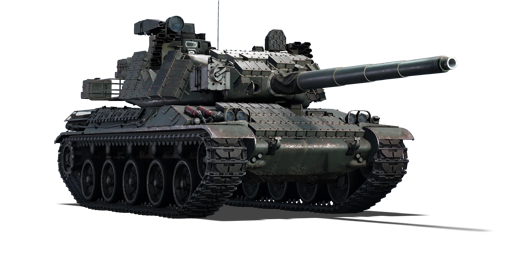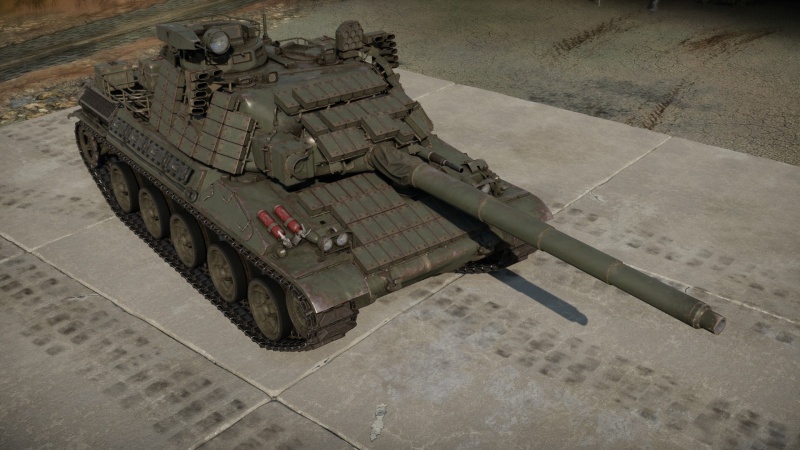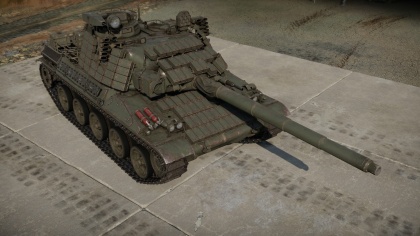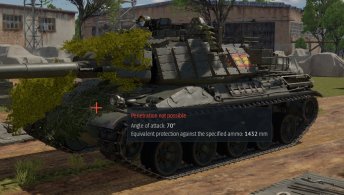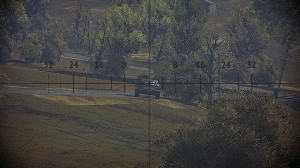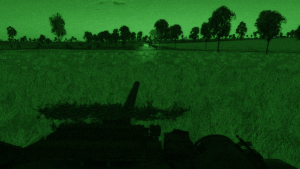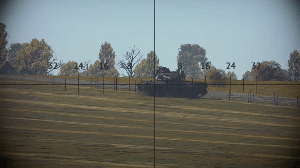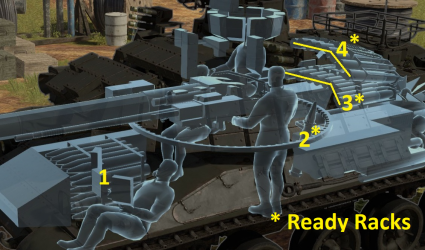AMX-30B2 BRENUS
Contents
| This page is about the medium tank AMX-30B2 BRENUS. For other uses, see AMX-30 (Family). |
Description
The AMX-30B2 BRENUS is a Rank VI French medium tank
with a battle rating of 8.7 (AB/RB/SB). It was introduced in Update 1.77 "Advancing Storm".
The AMX-30B2 BRENUS, or Brennus in some sources, was a modernized French MBT which saw combat in the Gulf War.
General info
Survivability and armour
The AMX-30B2 has a complex array of armour plates in addition of the ERA.
The frontal glacis is in two parts, the upper area that is 50 mm RHA sloped at 76 degrees and the lower one being 79 mm CHA sloped at roughly 70 degrees. The lower part of the front glacis is, in theory, able to withstand the T-54 APCBC shell better than the Leopard does. However, shots contacting the upper part will often resulting the shot bouncing upward and penetrating the turret front, which is very weak (even the M18 GMC can penetrate it with ease). The lower glacis plate is not as strong since it is not sloped as much as the front plate, but penetrating this plate will often not result in a colossal damage. However, the curve joint between the upper and the lower glacis plate is very weak and often a penetration through this area will end with a one-shot.
Also, it is noted that there is a fuel container in the front of the tank protecting the ammo rack, which sometimes penetrating rounds will just set afire just like the T-54 does. The difference is that AMX-30 tank's first stage ammo rack is the turret rack, so after experiencing prolonged combat, the hull ammo rack will be emptied and left defused. The hull sides and rears are very weak, they are all 30 mm plates. Even anti-aircraft vehicles doing side shots will penetrate this tank fast (for example, the R3 T20 FA-HS at BR 4.0 for Italy).
The turret armour is not sufficient at this rank, nor at any rank from even rank IV upwards. The gun shield itself mostly offers a 60-100 mm protection. However, some sabot shots will get absorbed by the breech, which actually offers better protection in the AMX-30B2 than the Leopard 1 does. Shooting the turret ring will damage the turret drives, and can sometimes trigger a crew knock out. The turret sides are very weak, often gives you a protection around 60 mm. The rear is worse, plus the turret ammo rack is placed at the end of the turret rear, shooting this area will destroy the tank one shot.
The ERA offers a really good protection for chemical energy penetrators such as HEAT-FS, ATGMs and anti-tank grenades, having a protection of 400 mm from just the block itself. This makes the tank capable of withstanding hits of almost all HEAT-FS of the BR (most of them penetrate between 320 mm to 480 mm) and even some ATGMs (between 400 mm to 650 mm). It should be noted that ERA itself cannot stop all the spalling created by the premature explosion, some ATGM's like the 9M117 (ATGM of the T-55AM-1 and T-62M-1) will be partially stopped by the ERA reducing its spalling significantly but can still be able to damage modules and crew members (most of the time they will be left orange or red although they can sometimes knock them out). It is also able to reduce the penetration or stop ATGM like the 9M113 Konkurs (ATGM of the BMP-2) and 9M112 (ATGM of the T-64B) although do not expect it to happen all the time, it depends on your angling and where the missile impacts. Chassis should be angled most of the time to potentialize the ERA effectiveness with the 79 mm thick steel plate, capable of making the armour reach 1,432 mm of effective armour against CE penetrators (refer to picture) making it capable of even stopping completely 9M133 Kornet ATGM (ATGM of the BMP-2M) which has 1,300 mm of penetration.
EIREL Active Protection System
The AMX-30B2 BRENUS has access to an infra-red jammer, the EIREL APS. It is a constant active APS which provides protection against a wide variety of threats. The scanner-type jamming device (honeycomb shaped equipment next to smoke launchers) is mounted on the roof of the tank to cover the vulnerable frontal arc. It called "Infrared Countermeasure" for the following reason: SACLOS guidance utilizes a beam-riding guidance which is connected to the GPS (gunner main sight in some cases, on others it is a different sight like on T-55AM-1 and T-62M-1) which uses a flare as reference point for the guidance system in the ATGM. The missile moves with the gunner's sight and the flare tries to stay on the crosshairs. IRCM confuses the GPS with a brighter IR light decoy acting as the flare (the flare is also IR) which signals the ATGM to move to a different position nowhere near from the gunner's target.
The EIREL APS has a minimum jamming range of roughly 50 m, meaning it will only deviate ATGMs past 50 m although it depends on the ATGM speed and ATGM angle of attack. This is the approximate distance between all ATGM in-game but it may vary. It will be able to jam a missile launched by a Swingfire faster due to its launch speed and flight path than an M3 Bradley. It has a protection arc of ~60° horizontal (between 20°-30° horizontally, refer to gif) and 120° vertical (able to counter helicopter-launched ATGMs). The turret must be facing the threat in order to let the APS work properly.
EIREL will jam SACLOS missiles including wire-guidance:- 3M7
- 9M112 (launched from 2A46M-1)
- 9M113 Konkurs
- 9M114 Shturm
- 9M117 (launched from 2A70, D-10T2S, and U-5TS)
- 9M119 (launched from 2A46M-1)
- 9M120 Ataka
- 9M123
- 9M311
- ACRA (on the AMX-30 ACRA)
- BGM-71A TOW
- BGM-71B TOW
- BGM-71C I-TOW
- HOT-1
- HOT-2 TOW
- Kh-23M
- Kh-66
- MGM-51B (launched from M81 and M162)
- MGM-51C (launched from XM150E5)
- MILAN
- Rbs 55
- Rbs 56
- Roland
- Starstreak
- Swingfire
- VT1 (on the FlaRakRad)
Laser guided missiles (AGM-114 Hellfire, MIM146 ADATS, 9M133 Kornet, etc) will not be jammed by EIREL. In order to let the APS work, it must be tuned on with a key in the control section. The APS can be destroyed.
EIREL can be used while on the move (although turret must be facing the enemy). While on the move (specially horizontally), the jammed ATGM will move in an uncontrolled direction like normal jamming but riskier, keep this in mind as it can hit a track, engine deck or close enough to create fragmentation and mark the AMX-30 and/or friendlies. When moving forward to an enemy who fired an ATGM, it will be affected by the APS but due to the BRENUS momentum, the ATGM can hit the BRENUS if the ATGM is redirected towards the ground. EIREL creates a thermal signature which can be seen with thermal sights. It also can also be used as an IR spotlight (as shown in picture). It should be noted that this can be a disadvantage when in night maps as tanks with NVD (except when tanks are using thermal view) will be able to see the light beam. The APS should be turned on and off at commander's discretion. When on day maps, this will not be an issue. EIREL must have a clear line-of-sight with the enemy launcher (at least enemy sights must be able to see the tank). Tanks firing behind cover like the Swingfire can also be affected by the APS. As long as the enemy is within the jamming arc, the BRENUS will be protected against SACLOS ATGMs. It should be noted that the AMX-30B2 BRENUS has no access to Laser Warning Receiver (LWR) or Missile Alert Warning (MAW), so the player must rely on visual contact with the ATGM and the launcher (no LWR makes the helicopter lock-on invisible). Thankfully, the thermal sights will be capable of detecting the fireball created by the ATGM's at certain distances.
*Note: the commander does not have control of the where the enemy ATGM is redirected to
Armour type:
- Explosive reactive armour
- Cast homogeneous armour
- Rolled homogeneous armour (Rear roof, Engine grille)
| Armour | Front (Slope angle) | Sides | Rear | Roof |
|---|---|---|---|---|
| Hull | 79* mm (57-68°), 50* mm (52-76°) Front glacis 79 mm (0-57°), 30 mm (75°) Lower glacis |
35-57 mm (0-35) 30 mm Bottom 25 mm (70°) Belly |
30 mm (10°) Top 30 mm Center 25 mm (70°) Bottom |
15 mm 8 mm Engine grille |
| Turret | 30-150* mm (0-79°) Gun mantlet 30* mm (61-75°) Turret front top |
41.5* mm (19-47°) | 30 mm (1-64°) 20 mm (54-64°) Turret underside |
20 mm |
| Armour | Sides | Roof | ||
| Cupola | 60 mm | 20 mm | ||
| Special armour* | Kinetic | Chemical | ||
| ERA | 5 mm | 400 mm |
Mobility
| Game Mode | Max Speed (km/h) | Weight (tons) | Engine power (horsepower) | Power-to-weight ratio (hp/ton) | |||
|---|---|---|---|---|---|---|---|
| Forward | Reverse | Stock | Upgraded | Stock | Upgraded | ||
| Arcade | 73 | 73 | 38.2 | 1162 | 1,431 | 30.42 | 37.46 |
| Realistic | 66 | 66 | 663 | 750 | 17.36 | 19.63 | |
When fully upgraded, the engine offers a 750 hp output at 2400 rpm. Max speed is 65 km/h, and the tank can achieve 45-50 km/h on a map like Kursk (when driving downward, you can achieve 65 km/h). Reverse gear is 27 km/h, which is fast. The reverse gear is faster than Leopard 1's by 2 km/h. The tank feels somewhat lighter than Leopard 1 series of tanks, since it has lighter weight (note that Leopard 1 tanks have a 830 hp output engine).
Modifications and economy
Armaments
Main armament
The AMX-30B2 BRENUS features the same gun the other AMX-30's have in game, the 105/56 mm Modèle F1, CN-105-F1 in short. It is a potent main gun capable of displaying an excellent performance at its br. The gun is capable of firing the OCC 105 F1 HEAT-FS ammunition which is also present in past AMX-30 versions. As the AMX-30B2, the BRENUS has access to the OFL 105 F1 APFSDS ammunition, capable of penetrating 361 mm at 10 m at 0°, a very powerful dart capable of piercing most of the tanks it will face in its br. With its high velocity of 1,525 m/s, the BRENUS is more than capable of engaging targets at far range despite the relatively low zoom main sights. With addition of the laser rangefinder, doing long range engagements turn to be relatively easy with almost pinpoint accuracy.
| 105 mm CN-105-F1 | Turret rotation speed (°/s) | Reloading rate (seconds) | |||||||||||
|---|---|---|---|---|---|---|---|---|---|---|---|---|---|
| Mode | Capacity | Vertical | Horizontal | Stabilizer | Stock | Upgraded | Full | Expert | Aced | Stock | Full | Expert | Aced |
| Arcade | 47 | -8°/+20° | ±180° | N/A | 28.6 | 39.5 | 48.8 | 53.1 | 56.5 | 8.71 | 7.70 | 7.10 | 6.70 |
| Realistic | 17.9 | 21.0 | 25.5 | 28.2 | 30.0 | ||||||||
Ammunition
| Penetration statistics | |||||||
|---|---|---|---|---|---|---|---|
| Ammunition | Type of warhead |
Penetration @ 0° Angle of Attack (mm) | |||||
| 10 m | 100 m | 500 m | 1,000 m | 1,500 m | 2,000 m | ||
| OCC 105 F1 | HEAT | 400 | 400 | 400 | 400 | 400 | 400 |
| OE 105 F1 Mle.60 | HE | 25 | 25 | 25 | 25 | 25 | 25 |
| OFL 105 F1 | APFSDS | 361 | 358 | 350 | 341 | 332 | 322 |
| Shell details | |||||||||
|---|---|---|---|---|---|---|---|---|---|
| Ammunition | Type of warhead |
Velocity (m/s) |
Projectile Mass (kg) |
Fuse delay (m) |
Fuse sensitivity (mm) |
Explosive Mass (TNT equivalent) (g) |
Ricochet | ||
| 0% | 50% | 100% | |||||||
| OCC 105 F1 | HEAT | 1,000 | 10.95 | 0.05 | 0.1 | 1,020 | 62° | 69° | 73° |
| OE 105 F1 Mle.60 | HE | 700 | 12.1 | 0.0 | 0.1 | 2,000 | 79° | 80° | 81° |
| OFL 105 F1 | APFSDS | 1,525 | 3.8 | N/A | N/A | N/A | 78° | 80° | 81° |
| Smoke shell characteristics | ||||||
|---|---|---|---|---|---|---|
| Ammunition | Velocity (m/s) |
Projectile Mass (kg) |
Screen radius (m) |
Screen deploy time (s) |
Screen hold time (s) |
Explosive Mass (TNT equivalent) (g) |
| OFPH 105 F1 | 700 | 11.4 | 20 | 5 | 25 | 50 |
Ammo racks
| Full ammo |
1st rack empty |
2nd rack empty |
3rd rack empty |
4th rack empty |
Visual discrepancy |
|---|---|---|---|---|---|
| 47 | 20 (+27) | 19 (+28) | 9 (+38) | 1 (+46) | No |
The ammo racks on the AMX-30B2 BRENUS consists of the same manner the other AMX-30 have their ammo racks: large ready racks in the turret's bustle, and one large ammo rack next to the driver. It should be noted that the ammo rack next to the driver can be affected by fires lit on the fuel tank surrounding it, which can lead to an ammo explosion. It is recommended to fill the driver's ammo rack as least as possible to raise the vehicle's survivability against frontal attacks, preferably carrying 20 rounds at most. Chemical energy attacks can be completely stopped by the fuel tank acting as spaced armor for HEAT and ATGM when the ERA is not enough to stop the whole penetration but will lit the vehicle on fire but still operational to retreat back to cover. It should be noted the fuel tank may not stop kinetic energy attacks like APDS or APFSDS causing an ammo explosion when rack is full, igniting the fuel tank, over-penetrating to the engine or all of the previously listed.
Machine guns
| 20 mm M693 | ||||
|---|---|---|---|---|
| Mount | Capacity (Belt) | Fire rate | Vertical | Horizontal |
| Coaxial | 1,000 (500) | 740 | 0°/+20° | N/A |
The 20 mm M693 coaxial autocannon is not just an anti-aircraft gun: with 57 mm penetration at flat angle, it will shred anything from armoured cars and SPAA to lightly armoured medium tanks' sides. In case a vehicle cannot be penetrated, use the autocannon to disable them before using your 105 mm cannon: target the gun barrel or the tracks. The 20 mm can also deal with low-flying aircraft with the extra 20 degrees of elevation. The only drawback is that the autocannon is coaxial, meaning the turret must rotate to track the targets.
| 7.62 mm A-A-F1N | ||||
|---|---|---|---|---|
| Mount | Capacity (Belt) | Fire rate | Vertical | Horizontal |
| Commander cupola | 2,050 (100) | 900 | -10°/+55° | ±120° |
The small calibre of the A-A-F1N machine gun makes it largely ineffective against all armoured vehicles but the ones with an open compartment. It still can be used to ping targets as a rangefinding help or to mow down minor obstacles blocking your line of sight.
Usage in battles
The AMX 30B2 Brenus cannot withstand a frontal encounter most of the time with most opponents due to the lack of a reliable armor and a stabilizer, making the tank an easy prey for almost anyone on the battlefield when in urban combat. However, the tank comes with a great mobility, able to reach 65 km/h in RB (72 in AB) even in reverse, making it the ideal tank to shoot the enemy and rapidly retreat to change position. The optics are better than the ones found on the other AMX-30s, but still not sufficient to properly see targets at long ranges, unlike tanks like the Leopard I with its 16x. However, it's not something to worry about: the thermal sight will allow the player to easily spot targets from far away. Its gun is capable of punching through most of enemy tanks, but caution is a must when uptiered: tanks like the T-72 cannot be damaged in the turret even by the AMX-30B2's APFSDS, leaving only the hull as a potential target.
The tank is not very suitable for urban combat, since most enemies will have a stabilizer and thus will be capable of landing the first shot, often knocking out the gunner, disabling the engine, the gun, or just setting the tank on fire. The best thing to do, in these cases, is to avoid the center of the map, flanking the enemy to hit him from the side and staying hidden from sight so enemies don't focus their firepower on the AMX-30B2.
In larger and flat maps the tank gives its best, thanks to the high mobility and the capability to shoot the enemy from far away and, as stated as before, the only threat for the AMX-30 is dart ammunition of really high penetrating CE ammunition as most of the time the ERA will do its job preventing CE penetrators to disable completely your tank, although the commander cupola can be an issue since it ruin the silhouette of the tank, making it clearly visible and perfect for trapshots, sometimes even when behind cover.
Modules
| Tier | Mobility | Protection | Firepower | |||
|---|---|---|---|---|---|---|
| I | Tracks | Parts | Horizontal Drive | OFPH 105 F1 | ||
| II | Suspension | Brake System | FPE | Adjustment of Fire | OFL 105 F1 | |
| III | Filters | Crew Replenishment | Elevation Mechanism | Smoke grenade | ||
| IV | Transmission | Engine | Artillery Support | Laser rangefinder | NVD | |
Pros and cons
Pros:
- Reactive armour, good chemical protection
- Good mobility
- Good forward and reverse speed
- Low profile
- Effective in an ambush role
- Thermals can be unlocked
- Laser rangefinder, high-velocity APFSDS rounds and thermal vision make for an effective sniper
- The coaxial 20mm cannon makes short work of thinly armoured vehicles and helicopters. Also works great against tracks and cannon barrels
Cons:
- Same ammunition as B2 version, random HEAT rounds effects and low APFSDS penetration
- No composite armour, low survivability against kinetic rounds
- Some weak spots between reactive armor plates
- Not having a gun stabilizer greatly hampers its performance
- Ammo racks in turret, high risk of explosion
History
During the mid to late 1990s, AMX-30B2 tanks of the 1er/ 2e Chasseurs tank regiments, which formed France’s rapid reaction force in peacetime, underwent upgrading under the Brenus modernization program, whilst two further regiments received modifications to quickly upgrade their AMX-30s with the Brenus package if needed (2e/5e Dragons). The Brenus upgrade package (acronym for briques réactives de surblindage) most notably allowed for the installation of 112 ERA blocks developed by the GIAT company across the front portion of the hull and turret. To compensate for the additional weight of the ERA packages, an improved 8-cylinder 750 horsepower MACK E9 diesel engine was fitted. The Brenus modernization upgrade was among the last to be fitted to the original AMX-30 tank.
- From Devblog
Media
- Skins
- Videos
See also
Links to the articles on the War Thunder Wiki that you think will be useful for the reader, for example:
- reference to the series of the vehicles;
- links to approximate analogues of other nations and research trees.
External links
| France medium tanks | |
|---|---|
| M4 Derivatives | M4A1 (FL10) · M4A4 (SA50) |
| AMX-50 | AMX M4 · AMX-50 (TOA100) · AMX-50 (TO90/930) |
| AMX-30 | AMX-30 · AMX-30 (1972) · AMX-30B2 · AMX-30B2 BRENUS · AMX-30 ACRA · AMX-30 Super |
| AMX-32/40 | AMX-32 · AMX-32 (105) · AMX-40 |
| Leclerc | Leclerc · Leclerc S2 · Leclerc SXXI · Leclerc AZUR |
| Other | D2 · S.35 · Lorraine 40t |
| Germany | Panther "Dauphiné" |
| USA | ▄M4A1 · ▄M4A3 (105) · ▄M4A4 · ▄M26 |


